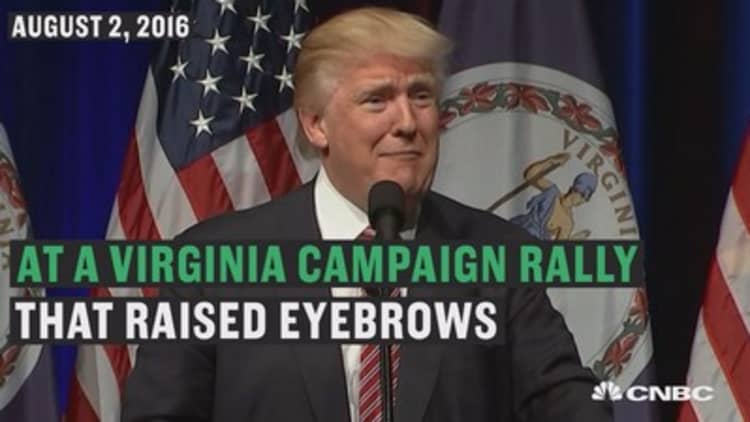
In an election year where both presidential candidates have had their trustworthiness and ability to handle sensitive information criticized, perhaps it is not surprising that the intelligence briefings presidential nominees receive have been hotly debated.
But experts are brushing off the criticism and focusing far beyond the briefings.
Nominees for president and vice president typically receive just one or two briefings, which provide threat overviews, in between their nominating convention and the general election, according to an intelligence official familiar with the matter. The official added that the candidates receive the briefings — organized and conducted by the Office of the Director of National Intelligence — due to their status as candidates, and do not require separate security clearances.
Both Donald Trump and Hillary Clinton have had their ability to receive the briefings called into question. Clinton was investigated by the FBI for her handling of classified information, and at a press conference, Trump said she should not be able to receive the security briefings.
"I don't think that it's safe to have Hillary Clinton, in light of what just happened, and in light of what we just found out, I don't think it's safe to have Hillary Clinton be briefed on national security because the word will get out," Trump said.
Across the aisle, Democrat and Senate Minority Leader Harry Reid told the Huffington Post that Trump should be given false information at his briefing. Trump has said he hopes Russia found emails deleted by Clinton off of her server.
"Fake it, pretend you're doing a briefing, but you can't give the guy any information," Reid told the website regarding Trump. "This guy, he's part of a foreign power."
However, Mike Leavitt, a former governor of Utah and the leader of Mitt Romney's 2012 transition team, said criticism that either candidate should not be trusted with the briefings ignored the will of voters.
"Obviously, the president of the United States has to be trustworthy with highly classified information, because they are the person that has the mandate from the people to have all information," Leavitt said.
He added that while the briefings are important, a high priority for him was preparing to put a national security team in place ahead of what he hoped was a Romney victory.
"[The briefings are] a factor, but until a person becomes the president-elect they have no authority or no responsibility and therefore the briefing process on national security is not particularly intense," Leavitt said. "Transitions also begin to get people cleared to handle classified information that don't get [the information] until after the election, but they have to be cleared for it."
Other experts also echoed Leavitt's point that the status as a presidential nominee should be enough to qualify someone for the briefings, regardless of criticisms.
"They are the nominees of the parties and clearly the decision has been made that in that position they have a need to know certain information," said former Secret Service Director and Commissioner of Customs and Border Protection Ralph Basham.
Basham said he had contributed information to the briefing agencies during his time in government.
"All of the agencies, particularly law enforcement agencies, make contributions to the agencies that are responsible for gathering it, disseminating it," Basham said.
It is unclear exactly how many members of the campaigns receive the briefings; the presidential and vice presidential nominee receive the briefings without requiring separate security clearances, while aides must have clearance to accompany, according to an intelligence official.
Max Stier, president of the Partnership for Public Service — which runs the Center for Presidential Transition — said that the complexity and the importance of the transition process means it must begin now, particularly when it comes to national security.
"Whoever wins, we should want a president that's well-prepared to run our government," Stier said. "The briefings are a small piece of a larger action that's necessary here."
Martha Kumar, director of the White House Transition Project, said the purpose of the briefings is twofold: to provide the candidates with information for potential decision-making, and to acquaint them with the personnel and resources of the intelligence community.
According to a report put together by the White House Transition Project and Rice University's Baker Institute, similar briefings have been delivered to presidential candidates since 1952.
Kumar also sought to minimize concerns over briefings, and the ability of Clinton and Trump to receive them.
"These briefings are an important part of the election preparation, and the political parties have made their choices," she said. "The idea that the candidates are going to come and the intelligence community drops all of the pearls out of the treasure chest is not realistic, that doesn't happen."
As of Saturday, a source with knowledge of the situation said the Clinton campaign has not had a briefing yet.
Neither the Trump nor Clinton campaign returned CNBC's request for comment.
UPDATED: This story was updated to include comments from a source regarding the Clinton campaign's briefing status.

